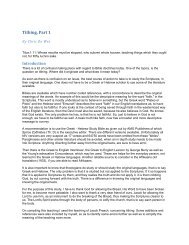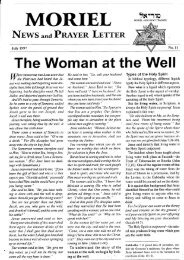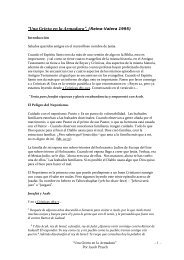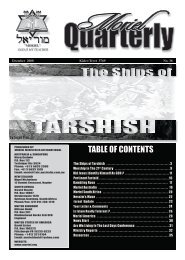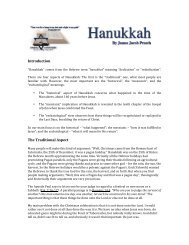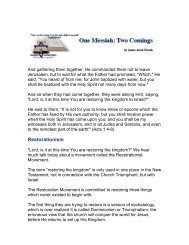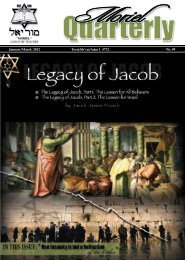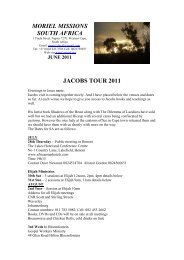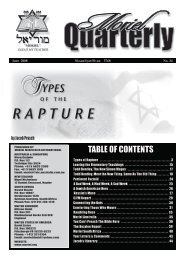April/June 20 No. 46 Nisan/Iyar//Sivan 577 - Moriel Ministries
April/June 20 No. 46 Nisan/Iyar//Sivan 577 - Moriel Ministries
April/June 20 No. 46 Nisan/Iyar//Sivan 577 - Moriel Ministries
Create successful ePaper yourself
Turn your PDF publications into a flip-book with our unique Google optimized e-Paper software.
destruction? And He did so to make known<br />
the riches of His glory upon vessels of mercy,<br />
which He prepared beforehand for glory,<br />
(Rom 9:1–23)<br />
Based on this Calvinists will say, “God is<br />
the Potter, we are the clay, who are we to<br />
argue with God? He chooses who goes to<br />
heaven, He chooses the Elect; the others are<br />
going to go to hell.” And of course they even<br />
take “Jacob I loved, but Esau I hated” in<br />
some cases and say, “White people I loved,<br />
Black people I hated” or “Protestant people I<br />
loved, Catholic people I hated,” etc.<br />
Remember that John Wesley’s revivals<br />
were an Arminian reaction to the social injustices<br />
bred by a dead church that was permeated<br />
with Calvinistic thought. That is when the<br />
people began coming out of the coal mines<br />
and the sweat shops and began giving their<br />
lives to the Lord in the tens of thousands.<br />
The Text in Context<br />
So Calvinists say, “How can we argue with<br />
God? He can do what He wants, He is sovereign;<br />
He makes one son this way and one son<br />
that way.” The first mistake these people are<br />
making is a text out of its context becomes a<br />
pretext. The context of Romans 9-11 is predominantly<br />
dealing with nations, not individuals.<br />
It is dealing with the Jews and the Gentiles.<br />
Paul quotes about the two twins. Let us<br />
read what he is commenting on in Genesis.<br />
The LORD said to her, “Two nations are<br />
in your womb; And two peoples will be separated<br />
from your body; And one people shall<br />
be stronger than the other; And the older<br />
shall serve the younger.” (Gen. 25:23)<br />
What these people do is take something<br />
that is talking about nations and apply it to<br />
people. There is a principle in midrash called<br />
“kal v’homer”–“light to heavy.” It says that<br />
what applies in a specific situation should<br />
also apply in a heavy one. But before we use<br />
that principle, we must first look at the context.<br />
It is not talking about God creating some<br />
people for this purpose and that purpose; it is<br />
talking about His election of nations.<br />
Moreover, we have something called “corporate<br />
solidarity” in Scripture. Corporate solidarity<br />
is where a person represents a nation<br />
or a larger group of people. Esau and Jacob<br />
respectively represent what becomes the Israelite<br />
and Arab nations. As time goes on, Esau<br />
is reconciled to Jacob. In Genesis God has<br />
prophetic purposes for the Arab people the<br />
same as He does the Jews. His election here<br />
has to do with His calling for service; it has<br />
nothing to do with salvation in the primary<br />
sense that these people are trying to make it.<br />
This is the same in the Book of Obadiah.<br />
The name of the patriarch becomes a metaphor,<br />
or a general term, for the nations descended<br />
from him. So before going any further<br />
we have to realize that these people are<br />
taking something talking about nations and<br />
applying it to individuals when that is mainly<br />
not even what the text is talking about. It<br />
can apply to individuals in some degree, as<br />
the text goes on to describe about Pharaoh,<br />
but when the New Testament interprets the<br />
Old Testament, we have to go back to read<br />
the Old Testament’s context.<br />
The Example of Hardening a Heart<br />
Pharaoh hardened his own heart. He repeatedly<br />
hardened his own heart. Only after<br />
he repeatedly hardened his own heart did<br />
God harden his heart. God raised him up and<br />
used him. He let the guy get away with murder.<br />
He let the guy get away with this, that,<br />
and the other thing while thinking he was<br />
the big cheese. He was deified by Egyptians,<br />
of course, and worshiped as a god, and God<br />
used him for His purpose, only to bring him<br />
down. But it does not say God hardened his<br />
heart until he repeatedly hardened his own.<br />
But though He had performed so many<br />
signs before them, yet they were not believing<br />
in Him. This was to fulfill the word of<br />
Isaiah the prophet which he spoke: “LORD,<br />
WHO HAS BELIEVED OUR REPORT?<br />
AND TO WHOM HAS THE ARM OF THE<br />
LORD BEEN REVEALED?” For this reason<br />
they could not believe, for Isaiah said again,<br />
“HE HAS BLINDED THEIR EYES AND<br />
HE HARDENED THEIR HEART, SO THAT<br />
THEY WOULD NOT SEE WITH THEIR<br />
EYES AND PERCEIVE WITH THEIR<br />
HEART, AND BE CONVERTED AND I<br />
HEAL THEM.” (Jn. 12:37–40)<br />
Could not, would not, should not. God’s<br />
hardening of a heart is always in response to<br />
its own hardening. It was not a case where<br />
God just hardened their hearts. Even Calvin<br />
admitted that it worked that particular way<br />
and according to that kind of dynamic.<br />
This does not quote from the Hebrew text;<br />
it quotes from the Septuagint, the Greek Old<br />
Testament where the mood is subjunctive.<br />
The subjunctive mood in Greek allows for<br />
the possibility, “Lest they see with their eyes<br />
and hear with their ears and turn to Me and<br />
be converted.” The possibility of their repentance<br />
still exists in the Greek subjunctive.<br />
More than that, along this vein is the idea<br />
of “be converted.” The Septuagint takes Hebrew<br />
and translates it into Greek. “Converted”<br />
in Hebrew is “teshuva.” The Hebrew word<br />
for “repent” and “convert” is the same thing;<br />
it means to turn away from sin toward God.<br />
This idea that He arbitrarily, or by His own<br />
sovereign will, just decides who will do this<br />
or that is the result of only giving one side of<br />
the story. But the Bible speaks of something<br />
very different. When He hardens hearts it is<br />
because they have repeatedly hardened their<br />
own. How many times did He send Moses<br />
back to Pharaoh? But let us look even further.<br />
The Potter in Jeremiah<br />
“God is the Potter, we are the clay.” This<br />
comes from the Book of Jeremiah 18-19. Let<br />
us read the Old Testament text in its context<br />
to see what Paul is talking about.<br />
The word which came to Jeremiah from<br />
the LORD saying,<br />
Feature Article – Continued<br />
When we see the “word” of the Lord, it<br />
is “d’var” in Hebrew, and the Greek would<br />
be “logos.” It is Jesus. This is Jesus Himself<br />
coming to Jeremiah in some kind of revelation.<br />
It is not like a message came, it is like a<br />
person came. It had to do with a personal encounter<br />
with what the rabbis call the “d’var”<br />
or the “mamre” (Aramaic), or what the New<br />
Testament calls the “Logos,” a personal encounter<br />
with Christ. When we read the Bible<br />
in the Spirit, it is not simply an encounter<br />
with the text; it is an encounter with the Person.<br />
What we get from the text derives from<br />
the encounter with the Person. If you are just<br />
getting information today you are not hearing<br />
from Jesus, you are just hearing from me.<br />
The question today is, are you encountering<br />
Jesus? Are you encountering the Word or<br />
just words? If you have the Word, the Word<br />
will be crystal clear.<br />
The word which came to Jeremiah from<br />
the LORD saying, “Arise and go down to the<br />
potter’s house, and there I will announce My<br />
words to you.”<br />
He had to go somewhere. God was going<br />
to show him from the illustration of a potter<br />
how to understand something. God did<br />
not say, “I am going to show you something<br />
now,” but “I am going to show you something<br />
that will explain it as an object lesson.”<br />
Then I went down to the potter’s house,<br />
and there he was, making something on the<br />
wheel. But the vessel that he was making of<br />
clay was spoiled in the hand of the potter;<br />
so he remade it into another vessel, as it<br />
pleased the potter to make. Then the word of<br />
the LORD came to me saying…<br />
(We can almost say, “Jesus said to him”)<br />
“Can I not, O house of Israel, deal with<br />
you as this potter does?” declares the LORD.<br />
“Behold, like the clay in the potter’s hand, so<br />
are you in My hand, O house of Israel. (Jer.<br />
18:1-6)<br />
“Can I not…deal with you as the potter<br />
does?” Once again, who is He saying this to:<br />
a person or a nation? They are taking something<br />
that predominantly applies to a corporate<br />
group of people–a nation, and over-applying<br />
it to individuals. Their second mistake is<br />
that they do not look at how the potter works.<br />
How a Potter Works<br />
When we take our study tours to Israel,<br />
we frequently show people in a Talmudic<br />
village in Galilee how the potter made earthenware<br />
vessels from clay. If it does not turn<br />
out right, the potter smashes it into mortar,<br />
lubricates it, and begins over. If he is not<br />
happy with that one he re-smashes it, but it is<br />
the same material. A potter in biblical times<br />
would normally not give up until he remade<br />
the thing at least a dozen times.<br />
Jesus does not save people to lose them.<br />
When we drop our cross z pick it up. Although<br />
we goof our lives up, He does not<br />
give up. He may have to break us and remake<br />
us time and time again, but it takes a<br />
long time for the Potter to give up on the ma-<br />
<strong>June</strong> <strong>20</strong>11 • <strong>Moriel</strong> Quarterly




